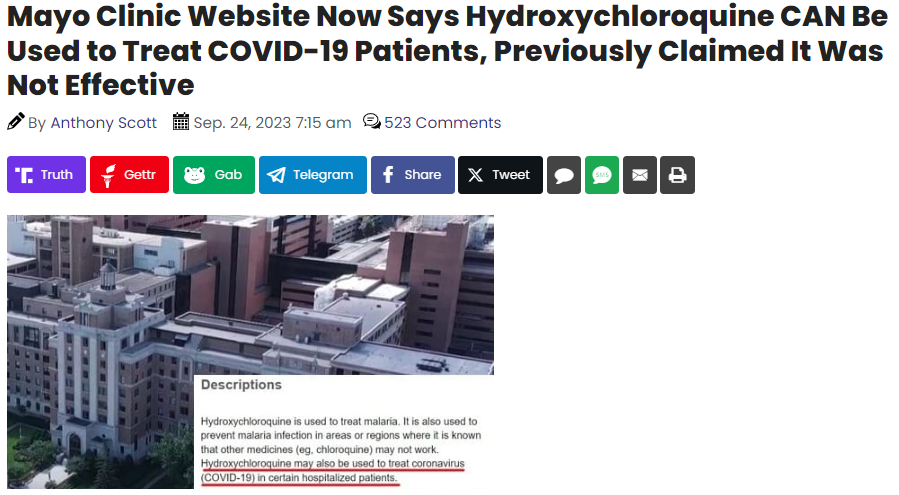
Did the Mayo Clinic website change in September 2023 to say hydroxychloroquine can be used to treat COVID-19 patients, after previously saying it was ineffective? No, that's not true: First, the Mayo Clinic's website was not "recently" updated to say that the drug, used to treat malaria, lupus and rheumatoid arthritis, can also be used for the treatment of COVID. Language saying hydroxychloroquine "may ... be used to treat coronavirus (COVID-19) in certain hospitalized patients" can be found on archived pages of the website from May 22, 2020 through September 25, 2023. Additionally, the Mayo Clinic's website didn't endorse the immunosuppressive and anti-parasitic drug as a general treatment for the virus, warning it "should only be used for COVID-19 in a hospital or during clinical trials."
The claims appeared in an article (archived here) published by The Gateway Pundit on September 24, 2023, titled "Mayo Clinic Website Now Says Hydroxychloroquine CAN Be Used to Treat COVID-19 Patients, Previously Claimed It Was Not Effective." The article opens:
The Mayo Clinic which has been touted by many as the best hospital system and medical research center in the United States, recently made an interesting update on their website regarding the drug Hydroxychloroquine.
This is what the post looked like on The Gateway Pundit at the time of writing:
(Source: The Gateway Pundit screenshot taken on Tue Sep 26 14:28:03 2023 UTC)
The quote underlined in red in The Gateway Pundit article above, "Hydroxychloroquine may also be used to treat coronavirus (COVID-19) in certain hospitalized patients," appeared on the Mayo Clinic website for 40 months, from May 22, 2020, to September 25, 2023, when that web page was taken down. It wasn't a recent update. Also, The Gateway Pundit neglected to include this warning, which immediately followed the highlighted section:
Using this medicine alone or with other medicines (eg, azithromycin) may increase your risk of heart rhythm problems (eg, QT prolongation, ventricular fibrillation, ventricular tachycardia). Hydroxychloroquine should only be used for COVID-19 in a hospital or during clinical trials. Do not take any medicine that contains hydroxychloroquine unless prescribed by your doctor.
Food and Drug Administration
Early in the pandemic, on March 28, 2020, the Food and Drug Administration (FDA) granted emergency use authorization (EUA) (archived here) for hydroxychloroquine and chloroquine to treat some adults and adolescents who were hospitalized with COVID-19. A couple of months later, on June 15, 2020, the FDA withdrew the EUA (archived here), saying:
Based on ongoing analysis and emerging scientific data, FDA has revoked the emergency use authorization (EUA) to use hydroxychloroquine and chloroquine to treat COVID-19 in certain hospitalized patients when a clinical trial is unavailable or participation is not feasible. We made this determination based on recent results from a large, randomized clinical trial in hospitalized patients that found these medicines showed no benefit for decreasing the likelihood of death or speeding recovery.
The Mayo Clinic website (archived here) echoed the FDA:
Hydroxychloroquine and chloroquine. These malaria drugs were authorized for emergency use by the FDA during the COVID-19 pandemic. However, the FDA withdrew that authorization when data analysis showed that the drugs are not effective for treating COVID-19. They can also cause serious heart problems.
Because hydroxychloroquine has many legitimate uses -- the treatment of malaria, lupus and rheumatoid arthritis -- doctors can still prescribe the drug for the treatment of COVID, if they choose to, even though the FDA doesn't recommend or endorse its use for that purpose.
Sometime on September 25, 2023, the Mayo Clinic shut down the web page (archived here) that featured the information cited in The Gateway Pundit. And the following day, on September 26, 2023, the Mayo Clinic website began redirecting traffic from the old link to a new web page (archived here) titled "Is hydroxychloroquine a treatment for COVID-19?" The opening paragraph of the page says:
Hydroxychloroquine is not recommended as a treatment for coronavirus disease 2019 (COVID-19). Also, hydroxychloroquine doesn't prevent infection with the virus that causes COVID-19.
The Mayo Clinic provided no explanation for the change or if it was related to The Gateway Pundit article. The organization did not reply to a Lead Stories request for a response.
Additional Lead Stories fact checks of claims related to hydroxychloroquine can be found here.


















